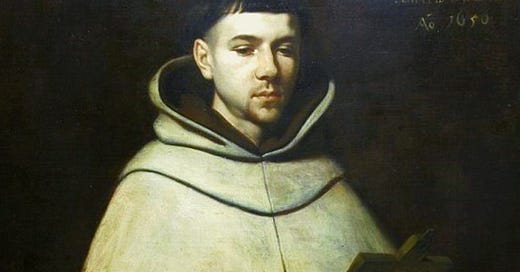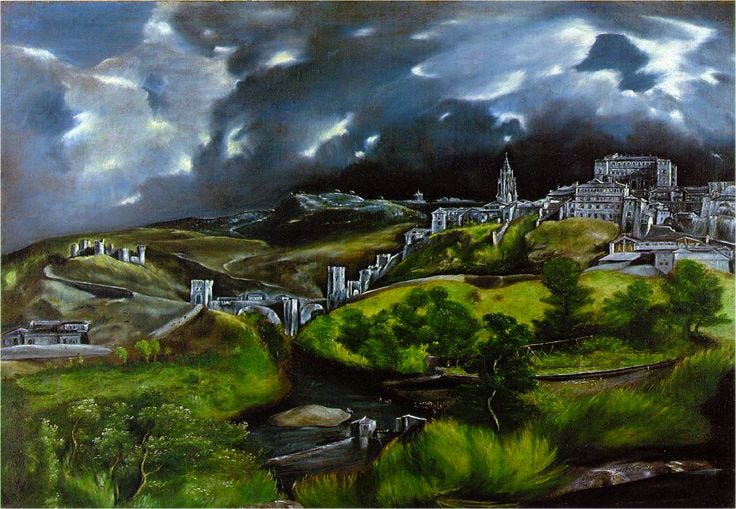In the dark night of the soul, bright flows the river of God.
Advent Day 6: John of the Cross (1542-1591)
Even if you’ve never heard of 16th century Spanish poet-priest John of the Cross, you probably know the title of his most famous poem, Dark Night of the Soul. This phrase has become shorthand for those times we are pulled under the waves of depression, anxiety, fear, loss and grief—when the lives we’ve so carefully constructed fall apart and nothing makes sense, and our old tricks and coping mechanisms, spiritual and otherwise, fail to save us from sinking in a sea of despair.
Who among us has not had a dark night of the soul?
Years before John of the Cross became the patron saint of dark nights, he was born into a family of Conversos, Spanish Jews who converted to Christianity under threat of the Inquisition. His family, already poor, was plunged deeper into poverty after his father’s death when John was just a few months old. From childhood, John was spiritually intuitive and compassionate, his poverty instilling in him an endurance for hardship and a loving-kindness for all creatures who suffered.
In 1563, at age twenty, John entered the Carmelite order, devoting his life to quiet prayer and charitable service. Not long after his ordination, however, he met famed Carmelite nun and reformer Teresa of Ávila. Teresa recognized the younger man as a mystical talent and kindred spirit, and she soon enlisted him in her campaign to rid their order of corruption and restore it to its humble, contemplative roots.
As with all reforms in all times and places, their campaign drew harsh resistance. While Teresa was targeted by the Inquisition, John was hounded from within the Carmelite community. In December 1577, during Advent, conservative friars kidnapped John and hauled him off to their monastery in Toledo. There, they locked him in a tiny cell used for a latrine. For months he was allowed no clothing other than what he’d been wearing when he was kidnapped. He was given no food but bread and the occasional scrap of fish. His only break from the putrid cell was when the friars took him out into the street for a public flogging.
As days turned to weeks, John began to lose hope that his friends and family would ever find him. As weeks turned to months, even the God to whom he’d always felt so close seemed to have forsaken him. When John prayed, he felt plunged into spiritual darkness. Like Paul, he despaired of life itself.
It was then that a sympathetic friar slipped him a piece of paper and pencil. John began to write.
What emerged was Dark Night Of The Soul. This mystical masterpiece tells the tale of a soul slipping out of a house under cover of night to go searching for God, the Beloved, who has gone missing. With only the soul’s longing, and the yearning memory of love, the soul roams from place to place seeking and, finally, finding. Reunited,
My face I reclined on the Beloved.
All ceased and I abandoned myself,
Leaving my cares forgotten among the lilies.
Love hadn’t abandoned the soul after all but was there all the time waiting to be discovered.
Nine months after his kidnapping, John was left temporarily unguarded one night. Moving with stealth he pried his cell door open and lowered himself through a window. In the dark, he found his way to a convent where the nuns nursed him back to health. When he was well enough to travel, he snuck out of Toledo in disguise.
Liberated, John resumed his reforms and writing. In his commentary on Dark Night Of The Soul, John reflected on his imprisonment. With some distance, he came to understand that the Beloved had never failed him. What had failed were his old ways of connecting to the Life-Light: the prayers at which he excelled, the religious dogmas he’d clung to with such vigor, the creeds he recited so loudly. His competence, intelligence, energy and piety—all those things for which he’d been recognized—in prison were tossed on the bonfire of spiritual death. Only when his dependence on his old ways were burned to ash and he was completely empty, in a state of utter surrender, did he begin to sense the faint flickers of a ray of dark glimmering in his soul. Like Paul, he found his greatest strength in what, to the world, looked like weakness and defeat.
It's probable that no one reading this has ever spent nine months locked in a latrine. But we’ve all been mowed down by a death, diagnosis, depression, divorce, or disillusion. We do not need to go looking for these things. They are part of being human. No matter how high we try to build our defenses, tragedy will find us. And when that happens, our old coping/soothing strategies usually fail. No prayer or pick-me-up can clear the storm clouds. We feel, like John, the divine spark in our souls has been snuffed out.
This is terrible while it lasts. And for some it lasts a long time. But John counsels that if we can hold on through the suffering of spiritual death there comes the possibility of resurrection. From the ashes rises a deeper sense of self, a deeper union with all creation. The empty heart may brim once again with greater love, greater compassion.
This is the diamond in the dung heap. It is the gift we don’t want. The truth that, if anyone tries to tell us about it while we are in the depths of our despair, will feel impossible, cheap, even abhorrent. A lie. It must be lived to be believed. This is where the mystics can help when we hit bottom. For John, rebirth after death wasn’t a platitude or cheap self-help. It was lived truth.
John persisted with his work to reform the Carmelites, traveling around Spain, founding new monasteries and convents modeled on contemplative silence and community service. But after Teresa’s death in 1582, the conservative opposition grew bold. John was eventually shunned by many of his fellow brothers, stripped of his leadership and banished to a remote monastery in Úbeda where he fell ill.
He died on December 14, 1591, during Advent. While jealousy and church politics ensured that not many fellow Carmelites mourned his passing, the public knew a good thing when they saw it. The day after his death, the people of Úbeda forced their way into the monastery where they held an impromptu celebration of life for the humble friar.
Though many of John’s fellow Carmelites were rough on him, time has been kind. Today he is a Doctor of the Catholic church, one of Spain’s greatest poets, and among history’s foremost mystics—a man who, in his most desperate hour, was guided by the Life-Light of the Beloved remembered, trusted and hoped for. This is the Advent Light we turn toward this time of year, just beyond the horizon yet, but every day a little bit closer.
Practice
There is a mystical adage that transformation only comes through great suffering and great love, and that these two are twins. If you love much you will suffer much. There is no way around this formula.
John of the Cross believed that our suffering was the gateway to greater compassion and love. In Christianity this is called the way of the cross: suffering, death, resurrection—resurrection not to perfection but, like Jesus, a rebirth with our wounds visible and on full display for the world to see.
Have you had a dark night of the soul from which you’ve come out the other side? If so, has it followed the classic suffering-death-rebirth pattern? Did you feel like you had to reconstruct your life from scratch?
Through journaling, meditation or prayer, take a few minutes to honor the grief you may still carry over the circumstances that led to your dark night. Follow that by honoring the fruits that came of your dark night. Finish by praying and/or lighting a candle for someone who is currently experiencing a dark night.
Catch Up On Recent Posts
Read the Introduction to The Heart Moves Toward Light: Advent With The Mystics, Saints and Prophets.
Previous posts in this Advent series can be found in our Archive.
Holiday Happenings at Life In The City
Dec. 11, 11:15 am: LITC’s original musical, Make Room In Your Heart.
Dec. 21, 7:30 pm: Blue Christmas, an intimate service for the longest night of the year.
Dec. 23, 7:30 pm: Our annual Christmas Eve-Eve service.
Dec. 25, 11:15 am: Celebrate Christmas morning with your church family.
Jan 1, 11:15 am: A quiet, contemplative service to welcome 2023.






